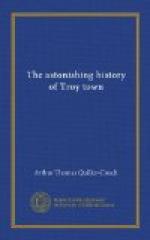But at this moment a dreadful rumbling shook the room. The chandeliers rattled, the egg-shell china danced upon the what-not, and a jarring sensation suddenly ran up the spine of every person in the company.
“It’s an earthquake!” shouted the Honourable Frederic, starting up with an oath.
Miss Limpenny thought an earthquake nothing less than might be expected after such language. Louder and still louder grew the rumbling, until the very walls shook. Everybody turned to a ghastly white. The Vicar’s face bore eloquent witness to the reproach of his conscience.
“I think it must be thunder,” he gasped.
“Or a landslip,” suggested Sam Buzza.
“Or a paroxysm of Nature,” said Mr. Moggridge (though nobody knew what he meant).
“Or the end of the world,” hazarded Mr. Goodwyn-Sandys.
“I beg your pardon,” interposed Mrs. Buzza timidly, “but I think it may be my husband.”
“Is your husband a volcano, madam?” snapped Mr. Goodwyn-Sandys, rather sharply.
Mrs. Buzza might have answered “Yes,” with some colour of truth; but she merely said, “I think it must be his double-bass. My husband is apt in hours of depression to seek the consolation of that instrument.”
“But, my dear madam, what is the tune?”
“I think,” she faltered, “I am not sure, but I rather think, it is the ‘Dead March’ in Saul.”
There was no doubt of it. The notes by this time vibrated piteously through the party-wall, and with their awful solemnity triumphed over all conversation. Tones became hushed, as though in the presence of death; and the Vicar, in his desperate attempts to talk, found his voice chained without mercy to the slow foot of the dirge. He tried to laugh.
“Really, this is too absurd—ha! ha! Tum-tum-tibby-tum.” The effort ended in ghastly failure. Thrum-thrum-tiddy-thrum went the Admiral’s instrument.
Miss Limpenny grew desperate. “Sophia,” she pleaded, “pray sing us one of your cheerful ballads.”
Sophia looked at Mr. Moggridge. He had always turned over the pages for her so devotedly. Surely he would make some sign now. Alas! all his eyes were for Mrs. Goodwyn-Sandys.
“I will try,” she assented with something dangerously like a sob.
She stepped to the “Collard” at a pace remorselessly timed to the “Dead March,” and chose her ballad—a trifle of Mr. Moggridge’s composition. It would reproach him more sharply than words, she thought. A cloud of angry tears blurred her sight as she struck the tinkling prelude.
“A month ago Lysander
prayed To Jove,
to Cupid, and
to Venus—”
Thrum-thrum-thrum went the double bass next door. Mr. Moggridge looked up. How thin and reedy Sophia’s voice sounded to-night! He had never thought so before.
“That he might die, if he
betrayed
A single vow that passed between us.”




